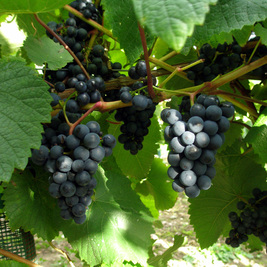
You may be familiar with the imagery of the vine and the branches in Jesus' monologue in John 15. But who is rightly attached to the vine? Jesus doesn't say. The expectation is made very clear that the branches are to bear fruit.
Working through the vine and branches text, we understand that God is the Gardener, tending the vineyard. Associations of the fruit with the wine of the last supper, and of the Gardener with the Garden of Eden are likely intentional. The Gardener does pruning, ensuring the production of fruit. What exactly is the pruning all about? What is being pruned? It seems the good, fruit-producing branches are subject to pruning so that they will be even more fruitful (vs. 2). The branches thrown into the fire (vss. 5-6) are those that have not remained with Jesus, on the vine, having withered, failing to produce fruit. What does that mean?
In the other reading, we encounter Philip's chapter in Acts, chapter 8. Philip meets up with an Ethiopian eunuch who is returning to his homeland after worshiping in Jerusalem. That he is not identified as a Jew is unsurprising. Eunuchs are an abomination in Judaism, purposefully disfigured and prevented from procreation. His role as chief financial officer to Ethiopian Queen Candace doesn't matter.
In the preceding passage, Philip had evangelized among the Samaritans, another detested group of folks according to the Judaism of the day. Now he has an encounter with the only kind of individual who may be regarded as more loathsome than a Samaritan! And he baptizes him at the first opportunity! It seems like anybody can be a branch on the vine!
In today's church, some folks have major problems with homosexuals and their roles and permissions to be among God's people. Frankly, it doesn't bother me that homosexuals, or Ethiopian eunuchs for that matter, are given access and welcomed into the family of God as full participants in the body of Christ. However, I do have an issue with some other folks. To find out who those might be, I'll direct you to the sermon video below, or the downloads below the video panel.
Working through the vine and branches text, we understand that God is the Gardener, tending the vineyard. Associations of the fruit with the wine of the last supper, and of the Gardener with the Garden of Eden are likely intentional. The Gardener does pruning, ensuring the production of fruit. What exactly is the pruning all about? What is being pruned? It seems the good, fruit-producing branches are subject to pruning so that they will be even more fruitful (vs. 2). The branches thrown into the fire (vss. 5-6) are those that have not remained with Jesus, on the vine, having withered, failing to produce fruit. What does that mean?
In the other reading, we encounter Philip's chapter in Acts, chapter 8. Philip meets up with an Ethiopian eunuch who is returning to his homeland after worshiping in Jerusalem. That he is not identified as a Jew is unsurprising. Eunuchs are an abomination in Judaism, purposefully disfigured and prevented from procreation. His role as chief financial officer to Ethiopian Queen Candace doesn't matter.
In the preceding passage, Philip had evangelized among the Samaritans, another detested group of folks according to the Judaism of the day. Now he has an encounter with the only kind of individual who may be regarded as more loathsome than a Samaritan! And he baptizes him at the first opportunity! It seems like anybody can be a branch on the vine!
In today's church, some folks have major problems with homosexuals and their roles and permissions to be among God's people. Frankly, it doesn't bother me that homosexuals, or Ethiopian eunuchs for that matter, are given access and welcomed into the family of God as full participants in the body of Christ. However, I do have an issue with some other folks. To find out who those might be, I'll direct you to the sermon video below, or the downloads below the video panel.
| 05-03-15-is_there_room_on_the_vine.pdf |
| 05-03-15-ff-answers.pdf |
